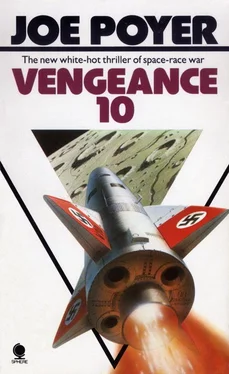‘I see. Exactly how does the system work?’ Speer asked. Dornberger began to sketch on a napkin. ‘It is really quite similar to a child’s top spinning inside a metal cage. Like a top, it always remains upright, no matter which way the surface on which it is mounted tilts. To take advantage of this natural phenomenon, a metal rod fixed to the rocket is passed through the top’s centre. A series of electrical switches are placed along the rod, and as the rocket begins to veer off course the rod turns with it, thus touching the top and closing a switch, which sends an electrical impulse to the motor controlling the graphite vanes extending into the rocket’s exhaust. The rocket is thus turned back on its proper course.’
‘My congratulations, Herr Doktor.’ Speer rose and bowed to von Braun.
Von Braun laughed and shook his head. ‘Thank you, Herr Speer, but the credit goes to spy work, not to us.’
‘Spy work?’
The others at the table groaned. It was an inside joke that had grown hoary with age but always drew the expected reaction from outsiders.
‘Yes, the system was developed by an American named Robert H. Goddard who developed the first liquid-fuelled rocket in 1923 and is now working with a small grant from the American government somewhere in their western states. Dr Goddard published a paper in 1937 which was ignored by nearly everyone in the world, including the Americans. But one of our embassy employees in Washington obtained a copy from the Library of Congress and sent it on to the Army Weapons Development Centre at Kummersdorf on the chance that it would be of value. Dr Goddard was actually the first to use vanes in the exhaust stream to control flight, and I would say that his work has saved us at least three years. Fortunately for us, his own people have ignored him entirely.’
The rowdier members of the party had begun to stagger off to bed, and the table grew quiet. A soft breeze blew landward, drawing its cooling breath across the parched island. Speer asked a few more questions about technical problems, then leaned back in his chair and regarded Dornberger for a moment.
‘Where will you go from here?’
‘To the A-Four,’ Dornberger replied without hesitation.
‘A-Four? I must admit that I was curious as to what intervened between the old A-Three and today’s A-Five.’
‘The A-Four is a very ambitious step forward and has been our objective all along,’ von Braun told him. ‘We did not realise just how ambitious until we were rather far along in its design. We saw very early that we needed a great deal more information than we possessed or could ever hope to gain from the A-Three. So, we dropped it and designed the A-Five as our test vehicle.’
‘Wait just a moment.’ Speer clutched his head in mock despair. ‘You are making me dizzy with so many numbers. Tell me, just what do you intend the A-Four to do?’
All eyes turned to Colonel Dornberger. ‘It will carry a thousand-kilogram high explosive warhead three hundred kilometres.’
An artillery officer, who had remained, whistled in amazement. ‘What do you intend its accuracy should be?’
‘Plus or minus two kilometres. And,’ Dornberger added, ‘we hope to improve that to within half a kilometre.’
The officer calculated the range in relation to impact deviation on his slide rule and shook his head. ‘Impossible,’ he said flatly.
‘I do not understand the technical details of artillery ballistics,’ Speer murmured, ignoring the officer, ‘but even I can recognise the value of such a weapon. How long would it take to produce one operational by troops under field conditions?’
‘That depends upon the priorities and budget restrictions under which we would have to operate. And of course, approval from the chancellory. The Führervisited us early this year at Kummersdorf and seemed not in the least impressed with our rockets.’
Speer only murmured a noncommittal response to Dornberger’s probe, and during the long silence that followed they could hear the gentle slap of waves on the sand.
An hour later Franz Bethwig and Wernher von Braun walked along the beach as they often did before retiring. Usually they reviewed the day’s events, discussed new ideas, or speculated idly about the future of rocketry. Tonight von Braun was quiet, resisting Bethwig’s attempts to draw him into conversation. Finally, in exasperation, Franz swore at him.
Von Braun grunted and shoved his hands deeper into his pockets. ‘I have a feeling that everything is about to change, and I don’t know if for better or worse. It seems to me that today we took the first real step towards space. The A-Five performed beautifully under control. We’ve proven what we knew all along, and now we have only to build ever bigger versions until we are there.’ He waved a hand vaguely at the sky and shook his head in exasperation. ‘But I… I just have a feeling that we are being sidetracked. Walter talks only about war rockets, and this Speer character agrees with him. Did you see how they all listened whenever he said anything? I don’t want to waste time building war rockets. Let the army find someone else to do that. We’ve shown them how.’
‘Don’t forget’ – Bethwig grinned – ‘you are in the army, my friend. Or at least paid by them, which amounts to the same thing.’
‘Don’t remind me.’
‘Why not? So far you’ve just wasted a great deal of energy kicking against the inevitable. You know as well as I why the army wants rockets. Goering was here today to see how much of a threat they might be to his precious bombers. I have a feeling this Speer is more than he seems; in fact, I suspect he was sent to keep an eye on Goering. Who knows what’s going on in Berlin these days? Even my father has gotten to be quite vague about it. But whatever, our salary is paid by the army, and if they tell us to build war rockets, I don’t see that we have any other choice. Do you?’
‘I guess not,’ von Braun mumbled.
The moon was nearly full and hung in mid-sky, a silver beacon strong enough to light the beach. Franz stared at it, trying to imagine as he had done a thousand times since childhood what it would be like to walk across its surface. It was not only that barren desert of frozen, airless stone that drew him, but rather the promise of what was to follow. The moon and the various planets of the solar system were only the beginning. There was a universe beyond to be explored and bent to man’s will. Mankind needed something greater than itself to challenge, if for no other reason than to refocus selfish thoughts and petty concerns. Space travel offered the ultimate goal, stars in their billions with unlimited room for the race to grow and expand.
Bethwig and von Braun shared that dream, had done so since the early days of the Verein fur Raumschiffahrt (Society for Space Travel), a small group of dedicated amateurs with a common goal: the realisation of space travel. The VfR was formed in 1929, and in the ensuing months he and von Braun had forged an uneasy alliance – this despite his own shyness and von Braun’s unconscious arrogance – as they were two of the very few members with sufficient private resources to allow them to devote endless hours to society projects.
Their friendship had grown, and when the Gestapo disbanded the society in 1932 and the army seduced von Braun in return for a university degree and a well-paying job building rockets, it was Bethwig he had hired first. Franz still remembered the excited telephone call, could still hear von Braun shouting over the static: ‘I tell you, they will actually pay us to build rockets!’
Bethwig broke the silence. ‘I talked with an army officer this morning. He told me that troops are gathering along the Polish border and have been doing so for weeks now. He thinks we’ll attack Poland before summer is out. If that’s true, we could be at war with England and France within a few months. And if that happens, the Reich will need war rockets, as many as we can build, and the fatherland will not be able to afford the cost of building a moon rocket. At least not for a good many years.’
Читать дальше












